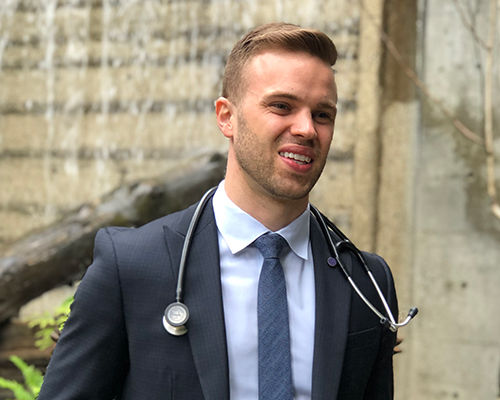Hometown: Toronto, ON
Program: Vancouver Fraser Medical Program

What attracted you to your field?
Neurosurgery has the power to transform lives. In this field, many of our most cherished human traits—such as sensation, cognition, and movement—are at stake when pathology afflicts the nervous system. My fascination with human psychology and its neurobiology, along with a technical mindset and desire to help others in crisis, made neurosurgery a perfect fit for me. As a neurosurgeon, you have the privilege and satisfaction of working with a dynamic surgical team to act decisively in life-threatening situations and use precise interventions that maximize quality of life outcomes for your patients.
In 10 years, what UBC moment will you still be talking about?
On graduation day, our class recited the Hippocratic oath alongside fellow physician Faculty and family members. This oath was led by Dr. Geoffrey Blair, a magnanimous, engaging UBC Clinical Faculty member in Pediatric General Surgery. Before leading us through the oath, Dr. Blair suddenly leapt atop the platform podium, asking our class, “What did I tell you to remember?”. In unison, the three-hundred new doctors recalled, “Beware of the child who vomits green!” It had been four years since Dr. Blair performed a similar theatrical gesture, jumping on a classroom table to illustrate this memorable clinical pearl. This candid moment captured the essence of my four-year journey at UBC, one my classmates and I will cherish for years to come.
What has the Indigenous MD Program meant to you?
I was fortunate to develop a strong family among fellow First Nations, Métis, and Inuit students, Faculty and elders through the Indigenous MD Admissions program. Much like our medical undergraduate class, my Indigenous peers came from diverse backgrounds and stories. We developed deep partnerships through leadership symposiums, traditional activities, social dinners, curriculum development and community outreach. As one of the largest graduating classes from this program to date, we now enter our residency with an enriched understanding and responsibility to provide culturally competent care to our Indigenous patients.
What’s next for you?
In July, I move to Edmonton to start my six-year residency training in neurosurgery at the University of Alberta. This involves a year of core training in surgical foundations, followed by several years specialized instruction in brain, spine and nerve surgery. As part of residency, I will partake in at least one year of academic research, with the additional opportunity to pursue a Master’s or PhD degree, which would be an asset to a career as a surgeon-scientist.
As you look ahead, what (or who) inspires you?
Whether it is a senior surgeon, fellow resident, or memorable patient, mentors come in many forms as my primary source of inspiration. Yet I also believe that when someone has found their true calling, inspiration arises from within. In my life, this inspiration has spawned a passion for neurosurgery that focuses my energy and efforts in the lifelong pursuit of mastery. Ultimately I hope to make my mentors proud and use my skills to serve the community and mentor others to achieve their potential.
Name one thing on your bucket list.
Travel to Antarctica—provided I don’t meet the same frigid fate as the late Captain Robert Scott.